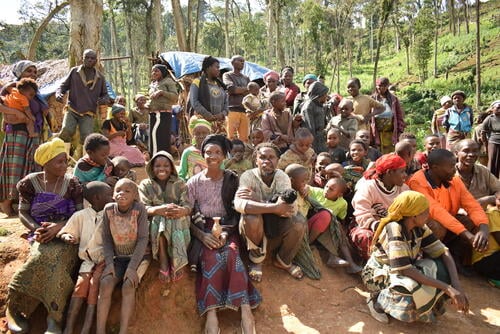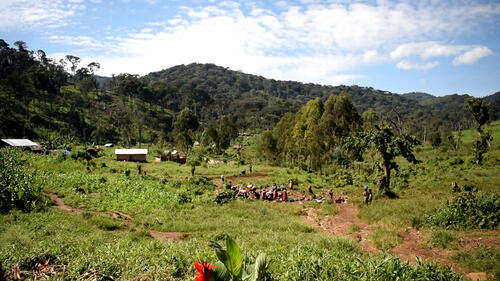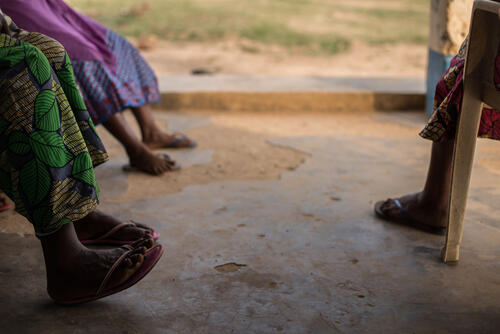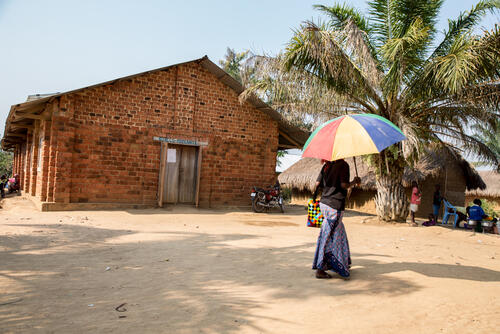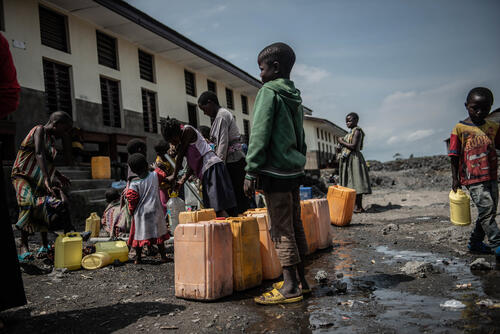In the last two years, the unrest in eastern Democratic Republic of the Congo has forced thousands of people to flee their homes. Many have found refuge on the other side of the border between North and South Kivu, where they share limited resources and land with equally vulnerable communities.
“We heard that there was peace in Katasomwa, so we decided to come here,” says Justin, a displaced person in this remote area of Kalehe Territory, South Kivu, where there is no basic infrastructure. “Many people were killed along the way. Since we got here, in July, we have had trouble finding food. We are constantly under threat from heavy rain and the shelters we live in can burn down at any time. Our lives are miserable.”
As Justin speaks, a straw hut is burning a few yards away. Nobody moves. There is nothing to do but let it burn. In a few seconds, the few possessions of one of the 957 displaced households on this site in Katasomwa go up in smoke.
Originally from Masisi in North Kivu province, Justin had no choice but to flee with his family and thousands of other people. Fighting between the national army and Kinyarwanda-speaking armed groups over the past two years has caused more than ten thousand people to cross the provincial border into South Kivu.
“They threatened us at night. They burned our houses down,” says Justin. “They kept hitting us and even attacked some people with machetes.”
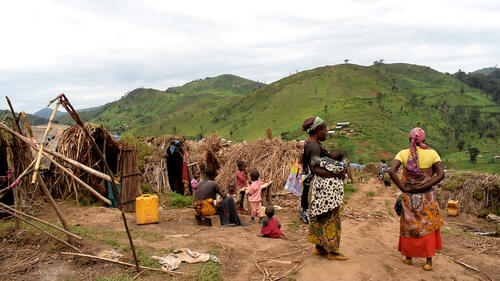
Staggering death rates
Most of the displaced people in Mushunguti, Ramba and Bushaku are women and children. After the ordeal of life on the road and the living conditions in displacement sites such as Katasomwa, they fall sick very quickly. Diarrhoea, acute respiratory infections and intestinal parasitosis are widespread and many children are severely malnourished.
The arrival of displaced populations has been a challenge for the fledgling health system. The Katasomwa health post is run by motivated staff but it lacks adequate means.
“Displaced women avoided coming to the health post because they have no money to pay for care,” says head nurse Esther Isabayo Benimana. “Many gave birth in the camp, and some died that way.”
MSF is responding to the dire health situation in these highlands by providing emergency medical assistance.
“We first concentrated on the groups with the highest death rates ─ mostly children under 15 and pregnant women,” says MSF emergency medical officer David Namegabe. “Maternal mortality in the area is very high. We also targeted all surgical emergencies.”
David’s words are cut off by the sound of heavy hammering. MSF logistics teams are rehabilitating the health post in Katasomwa, as well as other medical facilities in Mushunguti, Ramba and Bushaku.
People in the area have not had any immunisation in more than three years. MSF, in collaboration with the health authorities, organised a multi-antigen vaccination campaign. In the three areas, around 7,000 children were vaccinated against common diseases such as measles.
“We don’t understand why we are constantly forgotten”
The needs remain high and exacerbate inequalities that had been affecting the area long before the arrival of the displaced people. The Pygmy communities were forced out of the Kahuzi Biega forest, where they had been living for generations until the park became a Unesco world heritage site. They are now subjected to discrimination.
“Any child can steal but it’s always the entire Pygmy community that gets blamed if something goes missing,” says Roza Nyirakongomani, a representative of this nomadic community. “People say it’s the Pygmies who steal. Why? Because we don’t have regular activities. Our girls get raped. They leave in the morning to try to earn money but come back empty-handed. They are just taken by force. Sometimes we even know who did it but we can’t take them to court because we don’t have the money to pay for a trial.”
These often-ignored communities warmly welcome any aid that can be offered. “We don’t understand why we are constantly forgotten,” says Roza. “It pains us.”
To respond to the needs of the most isolated communities and take some of the burden off health facilities, MSF has identified one member in each village to be a volunteer health worker. The volunteers should be able to provide basic health and medical care and refer people to the nearest hospital in Chigoma if need be.
After theoretical training, each volunteer receives a bundle containing a notebook, pens, rubber boots and medication. This basic package will enable them to improve the health status of their fellow community members.
Different lifestyles in the remote Mushunguti, Ramba and Bushaku areas has created mistrust towards the minority displaced and Pygmy communities and stigmatised them. Their rights, which are constantly violated, need to be protected. They also need better access to healthcare, education, justice and work so they can live decently and give their children a better future.
Since the beginning of MSF’s intervention in the area, our teams have carried out more than 4,000 consultations among host, displaced and Pygmy communities, and community health workers have given basic healthcare to more than 850 people. More than a hundred victims of sexual violence have received medical and psychosocial care and, through our collaboration with the health authorities, over 6,000 children have been vaccinated against measles and other common diseases, In the coming weeks, our colleagues will focus on improving sanitation and hygiene by constructing 80 latrines and a water network. The nutritional situation in the area is also concerning and we are closely monitoring the situation.



